Fanny Susan Copeland was a remarkable person whose life serves as a curiosity and inspiration. A British woman who was born in Ireland in 1872, grew up in Scotland, and moved to Slovenia in 1921, where she spent most of the rest of her life, dying at 98 in 1970, and buried at the foot of Mount Triglav.
Although she wrote an autobiography it was never published and will remain in copyright limbo until 2020. One person who’s seen this memoir is Eric Percival, whose great-great-great-grandfather, Fred Holloway, knew Fanny’s father, Ralph Copeland, once the Astronomer Royal for Scotland, with the two men meeting near Manchester in the early 1860's. Percival put together the original post that sparked my interest in Ms Copeland, and also kindly supplied some of the pictures that accompany this story. Unless otherwise stated, the facts set out below are also drawn from his account of her life, as based on her own and other reports.
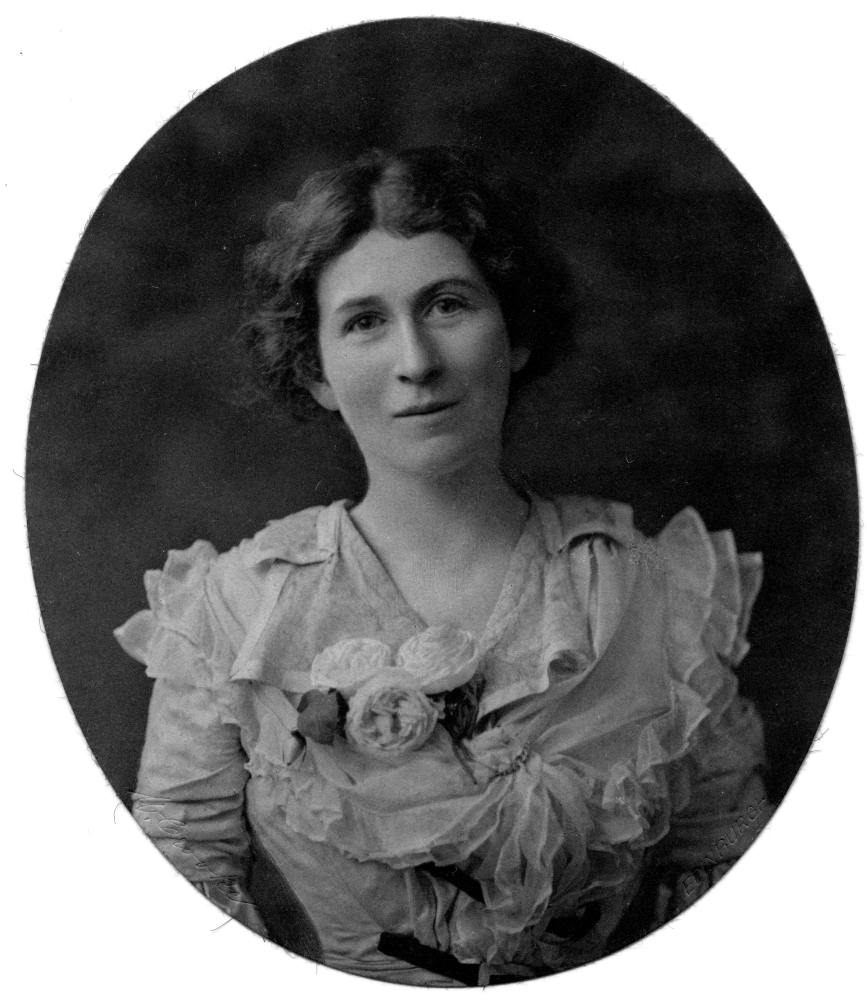
Although British by birth, Fanny was a thoroughly European woman, learning French and German as a child and being educated in Berlin shortly after turning 13. She also learned Latin, Italian, Danish, Norwegian and – due to her father’s interest in the Balkans – Slovenian. This connection with the country would be enough to get our attention, but Ms Copeland holds it because she bucks the standard narrative in terms of when and how one can make a new life for oneself. A brief outline of that life is as follows.
Fanny got married in 1894, at the age of 22, to escape her mother, but her husband was a 36-year old man who she never really liked. The couple had three children and then separated in 1908, finally divorcing in 1912, when Fanny was 40.
She developed a stronger connection with what would eventually become Yugoslavia soon after this, during the First World War, when she supported herself by doing translating for London-based South Slavic organisations. As part of this she translated Bogumil Vošnjak’s Bulwark against Germany: The fight of the Slovenes, the western branch of the Jugoslavs, for national existence, as well as serving as translator for the South Slavic delegation at the Paris Peace Conference.
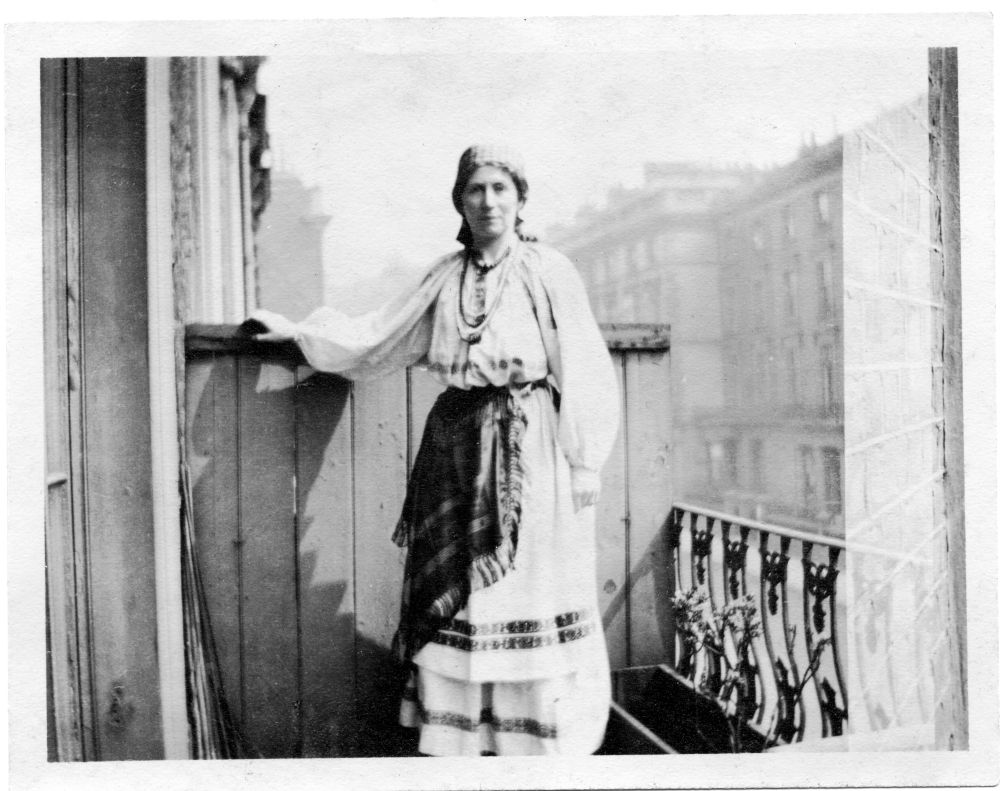
In "traditional costume"
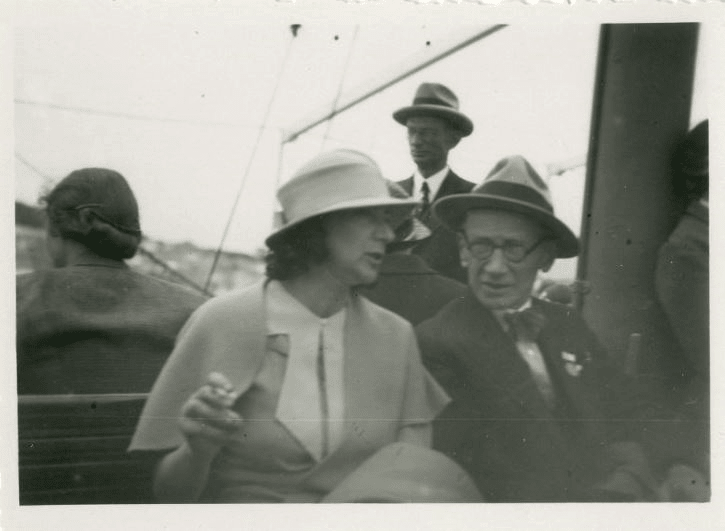
With Oton Župančič at the Congress of Dubrovnik in 1933
Ms Copeland then moved to Ljubljana in 1921, aged 49, when the city was part of the newly formed Kingdom of Serbs, Croats, and Slovenes. She was hired as a lecturer in English at the University (which itself only opened in July 1919), a post she held until 1941, when the Germans invaded. At this point, aged 69, she was arrested by the Gestapo and handed to the Italians, who moved her to Trieste, then to Arezzo and finally Bibbiena (in Etruria), where she spent the rest of the war “in open confinement”.
In 1953, aged 81, she finally moved back to Ljubljana. The death of her brother meant that she now had some savings, and thus Fanny Copeland lived in Hotel Slon for the rest of her life, continuing to work as a writer and translator.
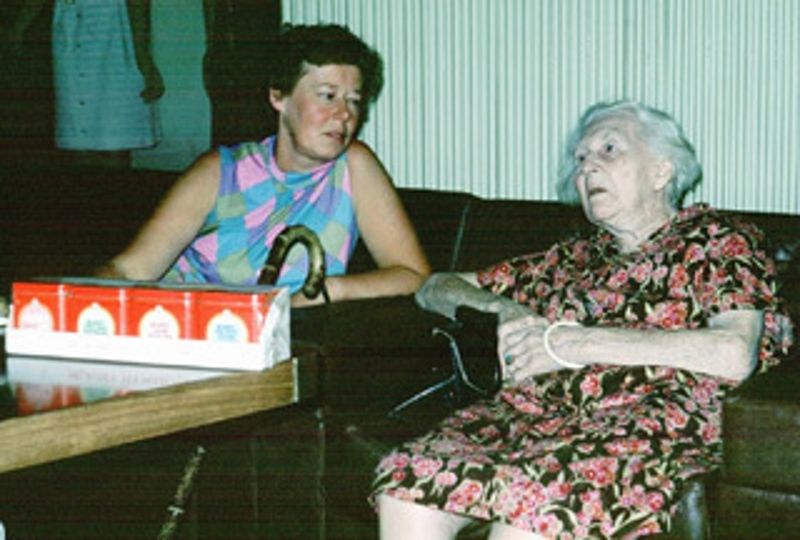
Ms Copeland, right, in the Hotel Slon, late 1960s
A pioneer of mountaineering tourism in Slovenia
But Fanny Copeland isn’t just a fine example of a person who didn’t let their gender or age dictate what they should be doing and when, or of someone who managed to successfully integrate themselves into a new country, as she also played a key role in the development of Alpinism as a local tourist offering, and in the promotion of Slovenia as a tourist destination. This section thus draws from an article by Janet Ashton called “Buried at his feet”: Fanny Susan Copeland, Triglav and Slovenia, and from another, Fanny Copeland and the geographical imagination, by Richard Clarke and Marija Anteric, both of which are recommended for more detail.
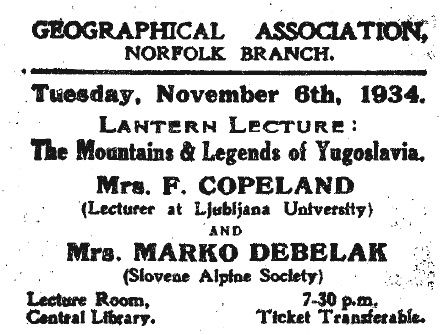
Ms Copeland felt a great attraction for the Julian Alps, and Slovenia the Slovenes in general, claiming they were the most Scottish of the Yugoslav communities, perhaps because of the mountains, long dominance by other powers, and characteristics of pragmatism and frugality.
She first climbed Triglav in the 1920s, not having taken up serious climbing until her 40s, and did so for the last time in 1958, just before her 87th birthday. She also wrote two books on the Julian Alps, Beautiful Mountains: In the Jugoslav Alps (1931), and A short guide to the Slovene Alps (Jugoslavia) for British and American tourists (1936). As she said in 1957, this was done in the “hope of attracting to Slovenia tourists of all types, from summer visitors in search of little-known beautiful and inexpensive Alpine resorts to Alpinists in search of accessible mountain ranges not yet wholly exploited or explored”.
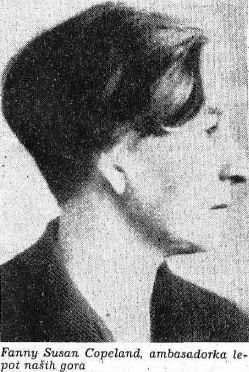
"Ambassador for the beauty of our mountains". www.gore-ljudje.net
Such efforts to reveal what in those days was still a very hidden gem were not without their obvious dangers, as she noted in a much earlier letter from 1923 when commenting on one of her many trips up Triglav: “It is an interesting walk, but as an expedition it is badly spoilt by the path having been made fool-proof. Result, every holiday is made hideous by hundreds of trippers, and the average person has to wait for a holiday to go up.”
Slovenski planinski muzej:- Fedor Košir, president of the Alpine Association of Slovenia and Fanny Copeland.
As mark of respect for her work to promote the Julian Alps, and to establish Triglav National Park, when Fanny Copeland died her funeral was organised by the Mountaineering Union of Slovenia. She was buried in the cemetery of the village church in Dovje, where you can still see her simple grave, as shown below.
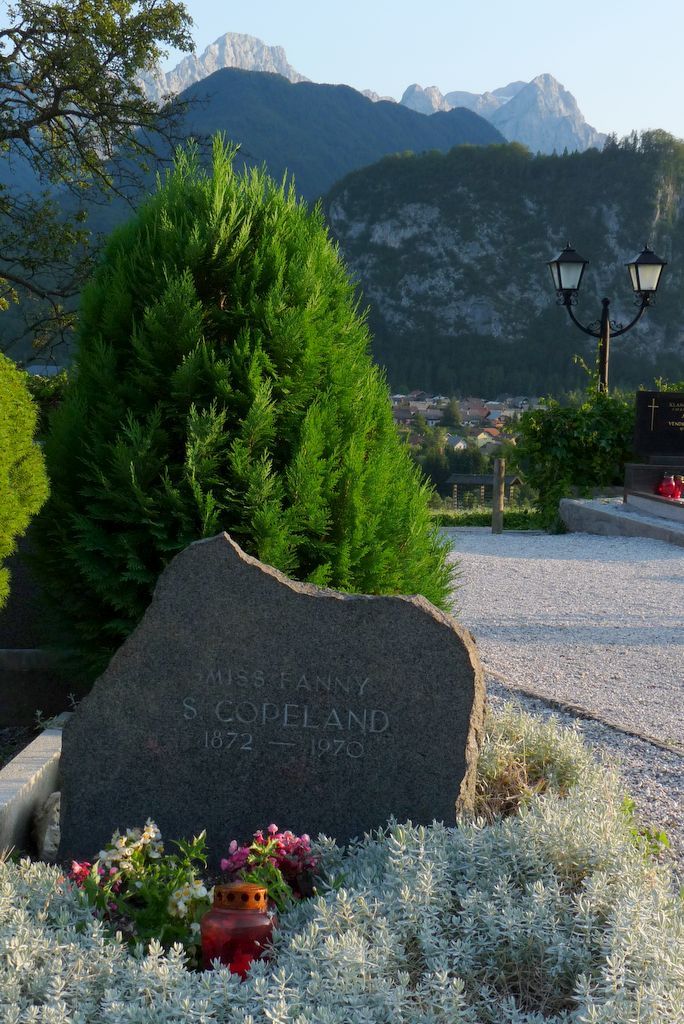
Wikipedia - Miran Hladnik CC-by-2.5
As Copeland wrote in 1931:
By fixed custom those that perish on Triglav are buried at his feet. In the pretty village church of Dovje, opposite the entrance of the stately Valley of the Gate (Vrata– truly a gate to be called Beautiful) they lie side by side. I think they would have it so. The long shadows of the regal avenue of peaks, down which they passed to their last adventure, sweep over their graves as the days and the years roll by; on All Souls’ day the mountaineers bring them pious offerings of prayer and lights, and from their tombstones their names cry greeting and warning to the hosts that go up year by year to visit the mountains, - greeting to the many who go up by the blazed trail where every danger spot is made safe with iron bolt and wire rope, to protect the unwary and put heart into the timid, - greeting to the few who seek, like themselves, to win the goal without guidance save the love of the heights, and no company except the extreme mysteries of life and death – greeting to the cragsman and the lover, to schoolboy and hunter, to smuggler and spy, and the ski-shod friend of the snows….
So if you find yourself in Hotel Slon, on Mount Triglav or by the village of Dovje, spare a thought for the remarkable Fanny Copeland, a woman who not only did as much as anyone else working in English to make the case for a separate Slovenian identity, one distinct from land’s association with the Habsburgs, Slavs and Serbo-Croatians, but also did much to bring the beauty of the land to a wider audience, and to share the best of her adoptive home with the world.
Postscript
As to what life was really like under Tito for a woman born to the academic elite under Queen Victoria, Copeland addresses this at the end of her autobiography, with a postscript to the reader:
But have you really found good reasons to go and live in a ‘communist’ state? This was a question I was often asked soon after my return to Ljubljana. Well - for one thing it depends on what you mean by 'Communism'. If you mean a totalitarian regime then my reply is that no Yugoslav would put up with such a system… The Yugoslavs are stout individualists, but they appreciate law and order. Ask any British tourist who has visited Yugoslavia in recent years.
All our stories on mountaineering in Slovenia can be found here




